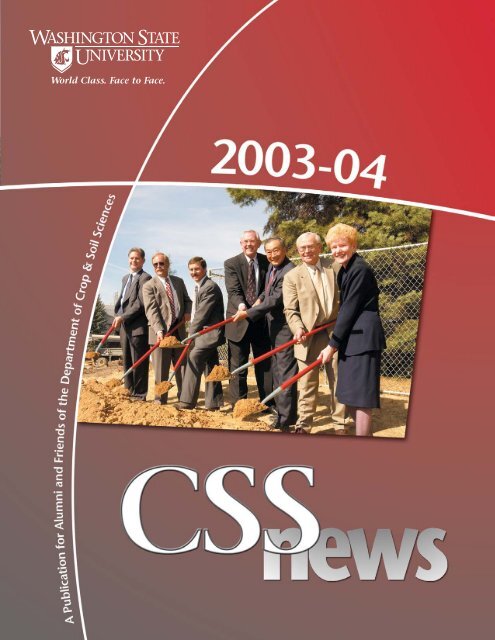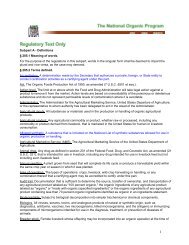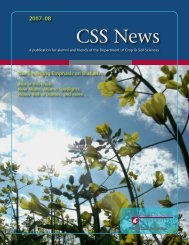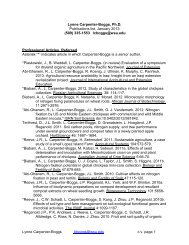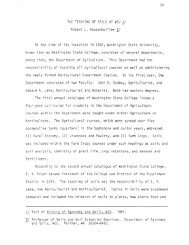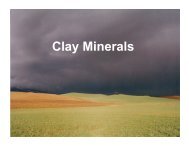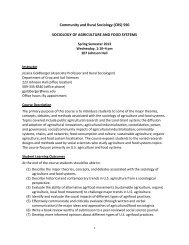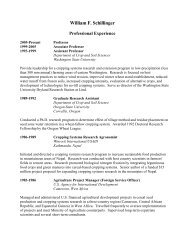CSS News 2003-04 pdf - Dept. of Crop and Soil Sciences ...
CSS News 2003-04 pdf - Dept. of Crop and Soil Sciences ...
CSS News 2003-04 pdf - Dept. of Crop and Soil Sciences ...
You also want an ePaper? Increase the reach of your titles
YUMPU automatically turns print PDFs into web optimized ePapers that Google loves.
Chair’s Message<br />
The sound <strong>of</strong> the future is ringing in my ears! Outside <strong>of</strong><br />
my second floor <strong>of</strong>fice are the beginnings <strong>of</strong> a new face<br />
on venerable Johnson Hall on the Pullman campus.<br />
Groundbreaking began in Summer <strong>2003</strong> to build a new<br />
wing along Stadium Way—Plant Biosciences I. The research<br />
<strong>and</strong> teaching labs in this new wing will support many <strong>of</strong> our<br />
state <strong>and</strong> federal research <strong>and</strong> teaching programs. Check<br />
out the live web cam linked to our http://css.wsu.edu/<br />
web page to view the building progress! The USDA also<br />
approved funding for the design <strong>of</strong> another addition on<br />
the east side <strong>of</strong> Johnson Hall, which will provide future<br />
facilities for remaining ARS <strong>and</strong> state programs. Plans for<br />
additional new buildings at Prosser <strong>and</strong> Mt. Vernon promise<br />
to provide modernized facilities for our programs at those<br />
locations as well.<br />
We have a new boss with a familiar face! Dr. R. James Cook,<br />
endowed Chair <strong>of</strong> Wheat Research <strong>and</strong> <strong>CSS</strong> instructor <strong>of</strong><br />
<strong>Crop</strong>s 403/503, <strong>Crop</strong>ping Systems, has taken on the position<br />
<strong>of</strong> interim Dean <strong>of</strong> the College after Dr. James J. Zuiches<br />
stepped down this past summer. Dr. Zuiches was instrumental<br />
in guiding the building projects described above, <strong>and</strong> he<br />
also successfully lobbied for a change in the name <strong>of</strong> our<br />
college to the College <strong>of</strong> Agricultural, Human, <strong>and</strong> Natural<br />
Resource <strong>Sciences</strong>. Dr. Zuiches was a staunch supporter <strong>of</strong><br />
<strong>CSS</strong> programs <strong>and</strong> we thank him for his years <strong>of</strong> dedicated<br />
administrative service to <strong>CSS</strong>, the College, <strong>and</strong> WSU.<br />
Dr. Cook is rolling up his sleeves to be an active leader.<br />
In his own words, “The last thing I want to be is a lame<br />
duck Dean.” Dr. Cook is challenging us to redesign our<br />
undergraduate programs under larger cross-unit <strong>and</strong><br />
potentially cross-college degree programs such as Plant<br />
<strong>Sciences</strong> <strong>and</strong> Agricultural Systems. Dr. Cook provides us<br />
with a strong voice <strong>of</strong> advocacy for mission-directed,<br />
science-based research, teaching, <strong>and</strong> outreach.<br />
A continuing decline in state support for higher education<br />
took its toll again this year, as our state funding for <strong>CSS</strong><br />
programs was cut by $250,000. Ongoing budget pressures<br />
are forcing us to shift the funding base <strong>of</strong> our research<br />
technological staff from state to grant support. Fortunately,<br />
our outst<strong>and</strong>ing faculty <strong>and</strong> staff brought in over $6 million<br />
in new grants <strong>and</strong> contracts to support our programs this<br />
past year. Unfortunately, the newly created program in<br />
weed science/weed ecology at Prosser was eliminated when<br />
Dr. Marty Williams accepted an ARS position in Illinois.<br />
Additional technologist support at Prosser was also lost with<br />
the budget cut. On the brighter side, we are pleased to<br />
welcome Dr. Richard Koenig <strong>and</strong> spouse, Dr. Theresa Cerny.<br />
Dr. Koenig is filling the soil fertility research/extension<br />
position vacated by Dr. Greg Schwab, who accepted a<br />
position at the University <strong>of</strong> Kentucky. Dr. Koenig earned<br />
his Ph.D. in our program (1993) <strong>and</strong> spent time at Colorado<br />
State <strong>and</strong> Utah State Universities before coming back home.<br />
Dr. Cerny, an ornamental horticulturist by training, will be<br />
contributing to <strong>CSS</strong> <strong>and</strong> Horticulture teaching programs.<br />
We also welcomed geostatistician Dr. Rick Rossi, another<br />
WSU grad, back to Johnson Hall as a member <strong>of</strong> the Center<br />
for Precision Agriculture team directed by Dr. Fran Pierce.<br />
Dr. Shiou Kuo returned home from his pr<strong>of</strong>essional leave in<br />
Taiwan where he studied environmental soils issues.<br />
Kudos to Dr. Tim Miller, who was promoted to E-3, associate<br />
extension specialist in <strong>2003</strong>; Tim is initiating a weed science<br />
graduate training program at the Mt. Vernon R&E Center.<br />
Thanks to Dr. Bill Johnston for his collaboration with Walla<br />
Walla Community College to institutionalize an articulation<br />
agreement for transferring turf students.<br />
Provost Robert Bates paid a visit to our department <strong>and</strong> we<br />
gave him an overview <strong>of</strong> our diverse programs. Dr. Bates<br />
is challenging us to raise our game to the next level. Last<br />
spring we held a statewide faculty <strong>and</strong> staff retreat at the<br />
Lazy F ranch near Ellensburg. It was a great opportunity<br />
for us to get reacquainted with our statewide colleagues.<br />
We tackled some tough issues <strong>of</strong> accountability, respect,<br />
team building, <strong>and</strong> communication; all essential foundations<br />
for moving us to that next level. The retreat provided<br />
an excellent starting point from which our department will<br />
improve our focus <strong>and</strong> direction.<br />
Operations in the <strong>CSS</strong> main <strong>of</strong>fice are settling down as<br />
new staffers John Brabb, Dori Emerson, <strong>and</strong> Nancy Bean<br />
are adding new energy <strong>and</strong> expertise while Mary Kate<br />
Alex<strong>and</strong>er, Deb Marsh, Judi Wutzke, <strong>and</strong> Paul Gylling<br />
realign their roles <strong>and</strong> responsibilities to best coordinate<br />
team efforts <strong>and</strong> to best utilize talents <strong>of</strong> the new staff.<br />
Improved efficiencies in financial management <strong>and</strong><br />
reporting, improved faculty, <strong>and</strong> student services are being<br />
realized with these changes . . . as the jack hammers <strong>and</strong><br />
construction trucks continue to rumble just a few feet away.<br />
• Bill Pan, Chair<br />
On the front cover:<br />
Plant Biosciences Building Groundbreaking, L to R: State Sen. Larry Sheahan;<br />
WSU Regent Peter Goldmark; State Rep. Mark Schoesler; WSU President V. Lane<br />
Rawlins; Joseph Jen, U.S. <strong>Dept</strong>. <strong>of</strong> Agriculture Undersecretary for Research,<br />
Education, <strong>and</strong> Economics; R. James Cook, interim dean <strong>of</strong> the College <strong>of</strong><br />
Agricultural, Human, <strong>and</strong> Natural Resource <strong>Sciences</strong>; Antoinette Betschart,<br />
area director <strong>of</strong> the U.S. <strong>Dept</strong>. <strong>of</strong> Agriculture Agricultural Research Service’s<br />
Pacific West area.
Put Me in the<br />
Game, Coach!<br />
So Coach Doba thinks he has it tough<br />
filling positions when players get injured?<br />
We have been continually challenged to<br />
<strong>of</strong>fer the best academic experiences possible<br />
to our students <strong>and</strong> we are indebted to<br />
several key instructors who have filled the<br />
ranks as faculty retire, positions are lost to<br />
budget cuts, <strong>and</strong> other faculty take pr<strong>of</strong>essional<br />
leave. Dr. Cathy Perillo has played an<br />
essential role in teaching many soils courses<br />
while creating some exciting new courses in<br />
sustainable agriculture. Dr. Chris Pannkuk is<br />
lending his international experiences to our<br />
course on World <strong>Crop</strong>ping Systems with Dr. Steve<br />
Ullrich, while Dr. Lynne Carpenter-Boggs, Kathy<br />
Colin-Peck, <strong>and</strong> Blake Ketchum have stepped up<br />
to fill temporary voids created during faculty<br />
pr<strong>of</strong>essional leaves being taken by Dr. John Reganold<br />
<strong>and</strong> Dr. Alan Busacca. Dr. Colin Campbell, scientist<br />
with Decagon Devices, Inc., generously <strong>of</strong>fers his time<br />
<strong>and</strong> energy to instruct Environmental Biophysics,<br />
a course established by his father, Dr. Gaylon Campbell.<br />
Dr. Perillo, Dr. Joan Davenport <strong>and</strong> Dr. Stevens taught<br />
<strong>Soil</strong> Fertility as I stepped into the Chair position. Special<br />
thanks to Joan <strong>and</strong> Bob for all <strong>of</strong> that travel between Prosser<br />
<strong>and</strong> Pullman, <strong>and</strong> to other faculty such as Dr. Craig Cogger<br />
<strong>and</strong> Dr. Eric Miltner for making the occasional trek to Pullman to deliver guest lectures! Dr. Gwen Stahnke developed two<br />
web-based courses for our ever growing turf program (61% <strong>of</strong> <strong>CSS</strong> undergraduate majors) which she manages from Puyallup.<br />
Dr. Kim Campbell, USDA-ARS wheat geneticist, continues to donate her time <strong>and</strong> energy in instructing our undergraduate<br />
seminar course <strong>and</strong> team-teaching our graduate crop breeding course while directing the Central Asia project that was initiated<br />
by Dr. Tom Lumpkin prior to his departure.<br />
• Bill Pan, Chair<br />
ALUMNI SPOTLIGHT<br />
Kathy Colin-Peck speaks on the subject <strong>of</strong> organic<br />
gardening <strong>and</strong> farming<br />
Dr. Dave Somers earned a B.S. in <strong>Soil</strong> Science in 1974 from the University <strong>of</strong> Maine, <strong>and</strong> his<br />
M.S. <strong>and</strong> Ph.D. in 1978 <strong>and</strong> 1983, respectively under the mentorship <strong>of</strong> Drs. Andy Kleinh<strong>of</strong>s<br />
<strong>and</strong> Bob Warner. He was a Postdoctoral Research Fellow in the Plant Genetic Manipulation<br />
Group, Botany Department, University <strong>of</strong> Nottingham, UK in 1983 before accepting a<br />
position at the Department <strong>of</strong> Agronomy <strong>and</strong> Plant Genetics, University <strong>of</strong> Minnesota as<br />
assistant pr<strong>of</strong>essor in 1984. In 1993, Dave accepted an endowed chair position in the Department<br />
<strong>of</strong> Agronomy <strong>and</strong> Genetics titled “Applications <strong>of</strong> Molecular Genetics to <strong>Crop</strong> Improvement.”<br />
In 1999, he was inducted as Fellow <strong>of</strong> the <strong>Crop</strong> Science Society <strong>of</strong> America <strong>and</strong> the American Society <strong>of</strong> Agronomy.<br />
Recently, he received the Award <strong>of</strong> Merit from the Minnesota Chapter <strong>of</strong> Gamma Sigma Delta, the Honor Society <strong>of</strong><br />
Agriculture.<br />
Dave has already achieved high distinction in science <strong>and</strong> he gives much <strong>of</strong> the credit to his training <strong>and</strong> experience at<br />
Washington State University, although I must add that his native intelligence <strong>and</strong> drive for achievement <strong>and</strong> perfection<br />
also has much to do with it. The Department <strong>of</strong> Agronomy <strong>and</strong> Genetics at the University <strong>of</strong> Minnesota is very fortunate<br />
to have Dave as a faculty member <strong>and</strong> the Department <strong>of</strong> <strong>Crop</strong> <strong>and</strong> <strong>Soil</strong> <strong>Sciences</strong> at Washington State University is very<br />
proud to have him as an alumnus.<br />
Dave enjoys fishing as a compelling hobby, particularly with a fly. While at WSU, he became an avid steelhead fisherman<br />
<strong>and</strong> we spent many an enjoyable hour together on the river <strong>and</strong> <strong>of</strong>ten discussed science while driving back <strong>and</strong> forth. I<br />
think that some <strong>of</strong> our better research ideas evolved from those discussions. Dave continues his love affair with fishing,<br />
but the opportunities in Minnesota are more limited. Therefore, he makes occasional trips back to Washington state to<br />
fish for steelhead. Dave is married to his long-time sweetheart Ann <strong>and</strong> they have three lovely daughters who are almost<br />
grown up now.<br />
• Andy Kleinh<strong>of</strong>s, Pr<strong>of</strong>essor/Scientist<br />
1
Musings <strong>of</strong> an Emeritus<br />
As an emeritus <strong>of</strong> the<br />
Department <strong>of</strong> <strong>Crop</strong><br />
<strong>and</strong> <strong>Soil</strong> <strong>Sciences</strong>, I<br />
salute Dr. Bill Pan<br />
<strong>and</strong> former Chair<br />
Dr. Thomas Lumpkin<br />
for their vision <strong>and</strong><br />
leadership. Surely, Tom<br />
is harnessing agronomy<br />
to the problems <strong>of</strong> crop<br />
production in Asia. Present<br />
Chair Bill Pan has a good feel for<br />
our responsibility to our constituents. With more <strong>and</strong> more<br />
<strong>of</strong> our funding coming from out-<strong>of</strong>-state, it is difficult to<br />
remember we are a L<strong>and</strong> grant institution with a top<br />
priority <strong>of</strong> serving the needs <strong>of</strong> the people <strong>of</strong> the state.<br />
They expect our utmost attention to serving their needs<br />
<strong>and</strong> want the closest <strong>of</strong> communication <strong>and</strong> support.<br />
We need to be ever mindful that state support is essential<br />
<strong>and</strong> we must constantly earn it. Failing to do so results in<br />
reduced funding.<br />
The halo over “basic research” is inviting, but we must<br />
never forget that our research must yield value—knowledge—<strong>of</strong><br />
some benefit to our state. A former director <strong>of</strong><br />
the Washington Agricultural Experiment Station once<br />
touted “basic research,” whatever that is, as many times<br />
more valuable than “applied research.” Whatever kind<br />
<strong>of</strong> research Orville Vogel used really paid <strong>of</strong>f with the<br />
development <strong>of</strong> the semi-dwarfs. Gaines in the first decade<br />
returned more wealth to the state <strong>of</strong> Washington than all<br />
the funds to the Experiment Station from its inception to<br />
that time. And <strong>of</strong> course, benefits around the world were<br />
many more times that amount. We can’t have victories<br />
like that every year, but we can strive for repeats.<br />
Participant Mary Bodley visits Dr. Gwen Stahnke’s<br />
ornamental grass display at the WSU turf research<br />
facility in Puyallup.<br />
My sympathy to the department<br />
chairman. If he can only figure<br />
out some way to print money,<br />
then everybody will be happy.<br />
The battle for funds is awesome<br />
<strong>and</strong> requires underst<strong>and</strong>ing<br />
<strong>and</strong> support from all <strong>of</strong> us.<br />
ARCPACS<br />
It is heartwarming to see the<br />
added emphasis on attention to our<br />
students. We should be sobered by the<br />
fact that only 5–10% <strong>of</strong> them will be filling positions<br />
in academia. We need to prepare the other 90% for<br />
employment in the non-academic arena. They are the<br />
ones who justify our existence as a department. I hope<br />
we instill in them the philosophy <strong>of</strong> pr<strong>of</strong>essionalism as<br />
followed by doctors, engineers, foresters, etc. Indeed, we<br />
are all pr<strong>of</strong>essionals, <strong>and</strong> if we are successful in our endeavors,<br />
we must live up to that philosophy <strong>of</strong> helping others<br />
<strong>and</strong> helping society. To be identified as pr<strong>of</strong>essionals in<br />
our field, all agronomists, especially those in non-academic<br />
arenas, should be certified through ARCPACS (American<br />
Registry <strong>of</strong> Certified Pr<strong>of</strong>essionals in Agronomy, <strong>Crop</strong>s <strong>and</strong><br />
<strong>Soil</strong>s). It provides the right mind-set <strong>and</strong> identifies us as<br />
truly qualified pr<strong>of</strong>essionals with valid expertise. It was<br />
none other than our Dr. Jim Engibous who initiated this<br />
institution!<br />
• B. Rodney Bertramson, CPAg<br />
Editor’s Note: Dr. Bertramson was former faculty <strong>and</strong><br />
chair <strong>of</strong> the Department <strong>of</strong> Agronomy <strong>and</strong> <strong>Soil</strong>s at WSU<br />
from 1949–1979. At age 90, he continues to attend the<br />
weekly seminar series, <strong>and</strong> remains involved in many<br />
civic activities around Pullman.<br />
<strong>2003</strong> Statewide Tour for Graduate Students<br />
On August 17, Dr. Dave Bezdicek, Dr. Kim Kidwell, <strong>and</strong><br />
former Graduate Programs Coordinator Lynn Kamal<br />
headed west with seven graduate students from the <strong>Dept</strong>.<br />
<strong>of</strong> <strong>Crop</strong> <strong>and</strong> <strong>Soil</strong> <strong>Sciences</strong> to participate in a 2 1 /2 day<br />
tour <strong>of</strong> the Puyallup <strong>and</strong> Prosser areas. The goal <strong>of</strong> this<br />
excursion was to expose students to different facets <strong>of</strong><br />
agricultural research at our <strong>of</strong>f-campus locations.<br />
Drs. Gwen Stahnke <strong>and</strong> Craig Cogger coordinated the<br />
Puyallup tour, which consisted <strong>of</strong> fabulous tours <strong>of</strong> a<br />
small local organic farm, sustainable organic research<br />
plots, <strong>and</strong> turf research plots. The group then headed<br />
to Prosser where Drs. Bob Stevens <strong>and</strong> Joan Davenport<br />
coordinated tours <strong>of</strong> various research projects involving<br />
grapes, hops, tree fruits, <strong>and</strong> potatoes.<br />
Dr. Bob Parker served as our tour guide during the<br />
Prosser trip, which included a visit to the Columbia<br />
Crest winery. Students were extremely pleased to<br />
have the opportunity to interact with <strong>of</strong>f-station<br />
faculty, <strong>and</strong> were all truly amazed at the wide range<br />
<strong>of</strong> cutting edge research that is being conducted at<br />
our <strong>of</strong>f-station facilities.<br />
• Kim Kidwell, Associate Pr<strong>of</strong>essor/Scientist<br />
2
• • • • • • • • • • • • • • • • • • • • • Back to the Future<br />
Where will the future generation <strong>of</strong> crop <strong>and</strong> soil scientists come from? Our faculty,<br />
staff, <strong>and</strong> students hope to inspire that next generation <strong>of</strong> bright young minds in<br />
K-12 by letting them know about the opportunities in crop <strong>and</strong> soil sciences.<br />
Over the past year we have put on workshops <strong>and</strong> tours for K-12 science teachers<br />
<strong>and</strong> students, participated in various recruiting events, <strong>and</strong> sponsored high school<br />
science competitions.<br />
Am<strong>and</strong>a McKinley, B.S. <strong>Crop</strong> Science, has been a leader in the CAHNRS Ambassadors<br />
Program that has conducted numerous high school visits to inform students about<br />
opportunities for college study.<br />
Laylah Scarnecchia took over the reins <strong>of</strong> the <strong>Crop</strong> <strong>and</strong> <strong>Soil</strong>s Club <strong>and</strong> organized<br />
the Annual FFA Agronomy Competition in Moses Lake with over 50 high school<br />
students from various Washington high schools. Tim Riebe, Eric Choker, Leah<br />
Baugher, Bruce Frazier, Joe Yenish, Cathy Perillo, Bill Pan, Steve Ullrich, <strong>and</strong> Brady<br />
Carter assisted in the organization <strong>and</strong> supervision <strong>of</strong> this event. Laylah also<br />
organized a summer Ag Teachers Workshop on soil characterization, <strong>and</strong> weed,<br />
insect, <strong>and</strong> pathogen identification.<br />
Steve Jones’ research team sponsored a summer workshop for gifted middle school<br />
students from the Spokane-area Libby Center on crop breeding <strong>and</strong> genetics.<br />
Ann Kennedy’s team put on a soil biology workshop for Pullman area grade<br />
schoolers. Rob Gallagher <strong>and</strong> Stewart Higgins mentored Pullman High School<br />
students on an organic farming project.<br />
Bill Johnston showed <strong>of</strong>f his turf research plots next to the WSU Student Recreation<br />
Center to a group <strong>of</strong> visiting high school students during Future Cougar Days while<br />
Bill Pan met with prospective students during the information <strong>and</strong> recruiting fair in<br />
Beasley Coliseum.<br />
Our faculty <strong>and</strong> staff at the <strong>of</strong>f-campus research <strong>and</strong> extension centers have always<br />
been active in their communities. Gwen Stahnke was a science judge at the Western<br />
Washington Fair in Puyallup, <strong>and</strong> Andy Bary, Eric Miltner <strong>and</strong> Gwen were science<br />
fair judges for K-12 at the Puyallup Fairgrounds. Bob Stevens is mentoring a couple<br />
<strong>of</strong> high school students on their soil science projects.<br />
Earning a B.S. in <strong>Crop</strong> Science (Turf Management<br />
option) has never been easier (i.e. quicker) for Walla<br />
Walla Community College (WWCC) Turf Management<br />
students, who decide to come to WSU. WSU <strong>and</strong> WWCC<br />
are currently in the process <strong>of</strong> signing a Memor<strong>and</strong>um<br />
<strong>of</strong> Underst<strong>and</strong>ing for graduates <strong>of</strong> the WWCC Associate<br />
in Applied Arts <strong>and</strong> <strong>Sciences</strong> degree (AAAS) in Turf<br />
Management who matriculate into the WSU B.S. degree<br />
in <strong>Crop</strong> Science, Turf Management Option.<br />
The partnership is intended to eliminate duplication<br />
<strong>of</strong> coursework <strong>and</strong> better integrate the two turf management<br />
programs to ensure a more efficient pathway to<br />
graduation. Turf students who complete the WWCC<br />
AAAS in Turf Management with a 2.0 cumulative grade<br />
point average will be granted Junior st<strong>and</strong>ing at WSU <strong>and</strong><br />
will need to take only 60 semester credits while attending<br />
WSU. To assist students <strong>and</strong> advisors, the agreement<br />
specifies in detail the proposed term-by-term (or semesterby-semester)<br />
course <strong>of</strong> study as <strong>of</strong>fered by WWCC <strong>and</strong> WSU.<br />
When the plan <strong>of</strong> study is followed, WWCC turf students<br />
will now be able to graduate from WSU in two years.<br />
• Bill Johnston, Pr<strong>of</strong>essor/Scientist<br />
WSU Senior Scientific Assistant Steven Lyon<br />
assists children from the Spokane Libby Center<br />
(a school for gifted children) with<br />
wheat hybridization.<br />
Washington State University was host to<br />
the Washington State Science Teachers’<br />
Association <strong>2003</strong> Annual Conference<br />
on the Pullman campus, <strong>and</strong> <strong>CSS</strong> was<br />
a major participant. Kim Kidwell<br />
delivered a keynote address on genetically<br />
modified crops. Mary Fauci <strong>and</strong><br />
Dave Bezdicek organized a tour <strong>of</strong> the<br />
WSU compost facility. Steve Jones lead<br />
a tour <strong>of</strong> the greenhouse facilities <strong>and</strong><br />
discussed crop breeding techniques<br />
while Ann Kennedy <strong>of</strong>fered a workshop<br />
on soil biology. Nancy Bean assembled<br />
workshop materials <strong>and</strong> posted a<br />
departmental display during the<br />
conference.<br />
These are just some examples <strong>of</strong> how<br />
our dedicated <strong>CSS</strong> faculty, staff, <strong>and</strong><br />
students are reaching back to the future<br />
crop <strong>and</strong> soil scientists at the K-12 level.<br />
• Bill Pan, Chair<br />
Turfgrass Management Partnership: WSU <strong>and</strong> Walla Walla Community College<br />
Teaching Assistant Travis Ricard (L) describing the<br />
characteristics <strong>of</strong> turfgrass species for vegetative<br />
identification in <strong>Crop</strong>s 301 lab, Turfgrass Culture.<br />
3
In August <strong>2003</strong>, in the window between summer <strong>and</strong> fall<br />
classes, the <strong>Dept</strong>. <strong>of</strong> <strong>Crop</strong> <strong>and</strong> <strong>Soil</strong> <strong>Sciences</strong> piloted a new<br />
course in conjunction with the University <strong>of</strong> Idaho<br />
entitled “Field Analysis <strong>of</strong> Sustainable Food Systems.”<br />
This was an intensive, week-long immersion course in<br />
which eight upper-level undergraduate <strong>and</strong> graduate<br />
students <strong>and</strong> two faculty, Dr. Cathy Perillo (WSU), <strong>and</strong><br />
Dr. Cinda Williams (UI), visited a variety <strong>of</strong> farming,<br />
ranching, marketing, <strong>and</strong> processing facilities in the<br />
Inl<strong>and</strong> Northwest. Some <strong>of</strong> these operations were large,<br />
others small; some were “organic,” <strong>and</strong> others “conventional”;<br />
some fit our pre-conceived notions <strong>of</strong> practices<br />
<strong>and</strong> approaches—many did not!<br />
During the days we explored the different operations<br />
<strong>and</strong> had in-depth discussions with the farmers <strong>and</strong> site<br />
managers. The evenings were spent in formal <strong>and</strong><br />
Teaching the History <strong>and</strong><br />
Ethics <strong>of</strong> Genetics<br />
Most days you cannot turn on the national news or<br />
open up a newspaper without hearing or reading<br />
about the latest genetic breakthrough. These new<br />
genetic discoveries, while <strong>of</strong>fering great hope, in some<br />
cases are also causing society to question what “these<br />
mad scientists” are up to now.<br />
As we teach the next generation <strong>of</strong> scientists at WSU,<br />
it is imperative that we instill not only an appreciation<br />
for history but also the idea that what we do may have<br />
implications far beyond those that we had anticipated<br />
for the future.<br />
The history <strong>and</strong> ethics <strong>of</strong> genetics (<strong>Crop</strong>s 512/MBios 525)<br />
has been taught in the Department <strong>of</strong> <strong>Crop</strong> <strong>and</strong> <strong>Soil</strong><br />
<strong>Sciences</strong> since 1997. The class had 25 students during<br />
Spring <strong>2003</strong> semester <strong>and</strong> has drawn graduate students<br />
from the University <strong>of</strong> Idaho <strong>and</strong> three different departments<br />
on the WSU campus during its six-year history.<br />
The students decide which topics to cover <strong>and</strong> they have<br />
included: eugenics (the science <strong>of</strong> human breeding);<br />
science stars <strong>of</strong> WSU; early plant breeders; theories <strong>of</strong><br />
evolution before Darwin; did Mendel fake it? the<br />
relationship between science fiction <strong>and</strong> science; gene<br />
therapy; science <strong>and</strong> religion; <strong>and</strong> genetically modified<br />
turf grass.<br />
Some courses that rely on discussion rather than lectures<br />
can result in a situation where a few students do all the<br />
talking. That problem is overcome in this course because<br />
the majority <strong>of</strong> the grade is based on preparation <strong>and</strong><br />
participation. Each student is required to enter into the<br />
discussions <strong>and</strong> with the wide range <strong>of</strong> topics, it is rare that a student does not have<br />
something to say.<br />
Over the years that the course has been taught it has evolved from mainly historical topics<br />
to now include ethical <strong>and</strong> philosophical perspectives. Students want to do what’s right<br />
when they leave WSU <strong>and</strong> by learning <strong>of</strong> the mistakes <strong>and</strong> triumphs <strong>of</strong> the past they will<br />
be better prepared to do so.<br />
• Stephen Jones, Associate Pr<strong>of</strong>essor/Scientist<br />
What is Really Going On Out on the Farm?<br />
informal discussions <strong>of</strong> our observations, our underst<strong>and</strong>ing<br />
<strong>of</strong> “sustainability,” <strong>and</strong> underst<strong>and</strong>ing how our food<br />
system works with respect to production practices <strong>and</strong><br />
environmental stewardship, as well as economic <strong>and</strong> social<br />
sustainability. Student teams put together oral presentations<br />
<strong>and</strong> subsequently turned in written analyses <strong>of</strong> their<br />
experiences, the sites, <strong>and</strong> the insights they gained.<br />
Students <strong>and</strong> faculty alike found the experience to be<br />
intensive <strong>and</strong> highly valuable from an educational perspective.<br />
In the words <strong>of</strong> one student, “We met visionaries,<br />
realists, idealists, businessmen, healers, <strong>and</strong> vanishing<br />
tribes.” We would like to make this a permanent course,<br />
continue to <strong>of</strong>fer it using a similar immersion approach,<br />
<strong>and</strong> invite farmers <strong>and</strong> other agricultural pr<strong>of</strong>essionals who<br />
might be interested in taking it for continuing education.<br />
• Cathy Perillo, Instructor<br />
4
Honors <strong>and</strong> Activities<br />
Frank Young was named Outst<strong>and</strong>ing Weed Scientist by the<br />
Western Society <strong>of</strong> Weed Science. What’s more, he received<br />
the award at the March <strong>2003</strong> regional meeting in Lihue,<br />
Kauai!<br />
Kim Kidwell is recipient <strong>of</strong> the <strong>2003</strong> award for <strong>CSS</strong>A Young<br />
<strong>Crop</strong> Scientist <strong>of</strong> the Year for her stellar research in crop<br />
genetics <strong>and</strong> breeding that blends classical wheat breeding<br />
with current techniques in biotechnology to improve yield<br />
<strong>and</strong> end-use quality in spring wheat. Her outst<strong>and</strong>ing<br />
teaching at both lower <strong>and</strong> upper divisions <strong>of</strong> our <strong>Crop</strong><br />
Science program is also recognized. Additionally, both Kim<br />
<strong>and</strong> Dr. Joan Davenport were selected to be participants in<br />
the 13th annual ESCOP/ACOP-sponsored Leadership<br />
Development Program for emerging leaders in agricultural<br />
experiment stations.<br />
Bob Stevens is a member <strong>of</strong> the Nutrient <strong>and</strong> Pest Management<br />
Training Development Team that developed a training<br />
model that will be adopted nationwide by NRCS. They were<br />
awarded the <strong>2003</strong> Department <strong>of</strong> Agriculture Honor Award<br />
for Maintaining <strong>and</strong> Enhancing the Nation’s Natural<br />
Resources <strong>and</strong> Environment. This is one <strong>of</strong> just a few USDA<br />
Honor Awards that are given each year for notable contributions<br />
to the Department’s mission, the Nation, or public<br />
service.<br />
Gwen Stahnke was named Chair <strong>of</strong> Division C5, <strong>Crop</strong><br />
Science Society <strong>of</strong> America, at the 2002 annual meeting<br />
in Indianapolis, Indiana. She will serve a one-year term.<br />
This is an elected position, voted on by members <strong>of</strong> C5.<br />
Ryan Higginbotham, <strong>Crop</strong> Science M.S. student, was a<br />
“highlighted” graduate student from CAHNRS at the<br />
December <strong>2003</strong> graduation, <strong>and</strong> Am<strong>and</strong>a McKinley, double<br />
major in <strong>Crop</strong> Science <strong>and</strong> Ag Econ, was the highlighted<br />
CAHNRS undergrad. In words <strong>and</strong> in true spirit, both<br />
students embody the phrase “World Class. Face to Face.”<br />
Congratulations to Gary Shelton, recipient <strong>of</strong> the <strong>2003</strong><br />
WSCIA O.A. Vogel <strong>Crop</strong> Improvement Association Award.<br />
Gary was presented his award at the WSCIA annual meeting<br />
in Moscow, Idaho on November 18. The award was<br />
established in 1973 in honor <strong>of</strong> Dr. Orville A. Vogel’s<br />
achievements <strong>and</strong> contributions to agriculture in the Pacific<br />
Northwest. Today, through this prestigious award, individuals<br />
who have made significant contributions to the pure<br />
seed program <strong>and</strong>/or crop production in Washington<br />
continue to be acknowledged.<br />
The Department <strong>of</strong> <strong>Crop</strong> <strong>and</strong> <strong>Soil</strong> <strong>Sciences</strong> safety committee,<br />
chaired by Vic DeMacon, received an award from Environmental<br />
Health Services at WSU for a most active <strong>and</strong><br />
effective safety committee.<br />
USDA-ARS Grain Legume Genetics <strong>and</strong> Physiology Research<br />
Unit continues to sponsor their annual Groundhog’s Day<br />
lentil/legume cook-<strong>of</strong>f. The cook-<strong>of</strong>f had a record number<br />
<strong>of</strong> participants in <strong>2003</strong>—including the renowned Taste E.<br />
Lentil. Recipes <strong>and</strong> pictures are posted to their web page<br />
at http://pwa.ars.usda.gov/pullman/glgp. Lorna Bell-Burns’<br />
Hot Crab-Lentil Casserole received the overall gr<strong>and</strong> prize<br />
for <strong>2003</strong>.<br />
Am<strong>and</strong>a McKinley, senior in <strong>Crop</strong> Science, was a recipient<br />
<strong>of</strong> the President’s Award for <strong>2003</strong>, giving recognition to<br />
excellence in leadership <strong>and</strong> service—to those whose<br />
leadership <strong>and</strong> service to the campus <strong>and</strong> the community<br />
will leave a lasting impact. Faculty, administrators, <strong>and</strong><br />
peers nominate the c<strong>and</strong>idates; a committee reviews each<br />
c<strong>and</strong>idate on the characteristics <strong>of</strong> leadership, values, selfawareness,<br />
<strong>and</strong> responsibility; <strong>and</strong> then selects the recipients.<br />
From the over 200 nominations submitted, 80 students<br />
were selected for this honor. The recipients represented all<br />
<strong>of</strong> the academic colleges, all campuses, <strong>and</strong> undergraduate,<br />
graduate <strong>and</strong> pr<strong>of</strong>essional students.<br />
Eighteen graduate students participated in the second<br />
annual Ropes course at Quaker Hill in McCall, Idaho on<br />
September 27. Rope courses present physical <strong>and</strong> mental<br />
challenges aimed at improveing communication, teamwork,<br />
<strong>and</strong> self-awareness. This group approached each challenge<br />
with a commendable amount <strong>of</strong> enthusiasm. From leaping<br />
<strong>of</strong>f a 30-foot pole to leading the blindfolded, each learned<br />
to trust one another <strong>and</strong> themselves as they pushed their<br />
physical <strong>and</strong> mental limits. Placing 18 graduate students<br />
simultaneously on a two-foot square platform also instilled<br />
the value <strong>of</strong> teamwork. Not only did the experience build<br />
strong relationships among <strong>Crop</strong> <strong>and</strong> <strong>Soil</strong> Science graduate<br />
students, but it reminded them <strong>of</strong> the cultural diversity that<br />
makes this department so unique. Graduate students who<br />
participated, <strong>and</strong> some that didn’t, helped sell black awned<br />
durum wheat at the Moscow Farmer’s Market to raise funds.<br />
Additionally, many thanks go to the faculty <strong>and</strong> the<br />
department for providing financial support.<br />
Craig Cogger was presented with the <strong>2003</strong> Kenneth J.<br />
Morrison Award at Spillman Field Day on July 10 in<br />
recognition <strong>of</strong> his work to improve soil <strong>and</strong> water quality<br />
<strong>and</strong> to facilitate recycling <strong>of</strong> organic wastes. The award<br />
honors the memory <strong>of</strong> Kenneth J. Morrison, who served<br />
as WSU extension agronomist from 1950 to 1987.<br />
The School <strong>of</strong> Molecular Biosciences (SMB) at WSU has<br />
awarded Matthew Arterburn, winter wheat breeding<br />
doctoral c<strong>and</strong>idate, with the Stephen Fodor <strong>and</strong> Janelle<br />
Benoit Fellowship for having the highest GPA earned<br />
among third year SMB graduate students.<br />
Michael Hecht, a physicist with NASA’s Jet Propulsion<br />
Laboratory, delivered the inaugural Gaylon Campbell<br />
Lecture in Environmental <strong>Soil</strong> <strong>and</strong> Water Science titled,<br />
“The Phoenix Mission to the Mars Polar Regions: Getting<br />
Down on Dirty” on November 18, <strong>2003</strong>. Hecht is lead<br />
investigator for the Microscopy, Electrochemistry, <strong>and</strong><br />
Conductivity Analyzer, a soil analysis payload scheduled to<br />
fly to Mars on the Phoenix mission in 2007. The Campbell<br />
Lecture was created to help further underst<strong>and</strong>ing <strong>of</strong><br />
environmental soil science. It is named for Gaylon Campbell,<br />
who spent nearly 30 years as a pr<strong>of</strong>essor <strong>of</strong> environmental<br />
biophysics <strong>and</strong> soil physics in WSU’s Department <strong>of</strong> <strong>Crop</strong><br />
<strong>and</strong> <strong>Soil</strong> <strong>Sciences</strong>. He retired from WSU in 1998 to become<br />
vice president <strong>of</strong> engineering at Decagon Devices, a local<br />
manufacturer <strong>of</strong> biophysical research instrumentation. The<br />
lecture was created through gifts from Campbell Scientific,<br />
Inc., <strong>and</strong> Decagon Devices, Inc.<br />
5
Honors <strong>and</strong> Activities (continued)<br />
• • • • • • • • Bill Nye <strong>and</strong> Steve Jones<br />
Comedian/scientist “Bill Nye the Science Guy” <strong>and</strong> five members<br />
<strong>of</strong> his production crew paid Stephen Jones <strong>and</strong> the winter wheat lab<br />
a visit May 14, <strong>2003</strong> to film the thirteenth episode <strong>of</strong> Nye’s science<br />
show targeted for adult viewers. The focus <strong>of</strong> the episode will be<br />
“GM Food.” They were interested in topics including how to<br />
cross wheat <strong>and</strong> the history <strong>of</strong> wheat breeding, as well as issues<br />
<strong>of</strong> concern regarding the private ownership <strong>of</strong> genes <strong>and</strong> ideas.<br />
The episode aired fall <strong>2003</strong> <strong>and</strong> included interviews with<br />
scientists at the University <strong>of</strong> California, Berkeley <strong>and</strong> U.C.<br />
Davis. Bill Nye stars as the host <strong>of</strong> the show designed to get kids<br />
interested in the science <strong>of</strong> everyday, <strong>and</strong> some not-so-everyday,<br />
things. On a full range <strong>of</strong> subjects, including ecology, biology,<br />
chemistry, <strong>and</strong> physics, Nye gives an easy-to-underst<strong>and</strong>, yet<br />
informative, lesson that both kids <strong>and</strong> grownups can enjoy.<br />
His shows have received 17 Emmy awards.<br />
Under the direction <strong>of</strong> advisors Dr. William Johnston <strong>and</strong><br />
graduate student Travis Ricard, the Turf Club has continued<br />
to thrive <strong>and</strong> be a viable outlet for students interested in the<br />
turfgrass world. Membership this year has increased to<br />
eighteen. Incoming President John Hicks, Vice President<br />
Michael Picha, Secretary Casey Krueger, Treasurer Curt<br />
Chambers, <strong>and</strong> Publicity Chairman John Ball are currently active in the planning, development, <strong>and</strong> implementation <strong>of</strong> an<br />
alumni newsletter, coordination <strong>of</strong> the club spring field trip, planning the annual spring golf tournament fundraiser, <strong>and</strong><br />
coordinating guest speakers, as well as involvement in university <strong>and</strong> Department <strong>of</strong> <strong>Crop</strong> <strong>and</strong> <strong>Soil</strong> <strong>Sciences</strong> activities.<br />
<strong>2003</strong> CAHNRS Awards • • • • • • • • • • • • • • • • • • • • • • • • • • • • • • • • • • • • • • •<br />
Faculty Excellence in Extension: Robert G. Stevens.<br />
Stationed at the WSU Prosser Irrigated Agricultural Research<br />
<strong>and</strong> Extension Center, Bob has conducted field research on<br />
five <strong>of</strong> Washington’s top ten agricultural commodities. Over<br />
the past 17 years, he has made 567 presentations to various<br />
groups covering a broad spectrum <strong>of</strong> topics, including<br />
contamination <strong>of</strong> heavy metals in fertilizers, an issue that<br />
received widespread attention in the media in the late 1990s.<br />
Classified Staff Excellence Award: Debra J. Marsh. Debra<br />
has been the senior secretary for the Pullman-based <strong>Crop</strong><br />
<strong>and</strong> <strong>Soil</strong> <strong>Sciences</strong> extension faculty since 2000. Additionally,<br />
she provides media support to the department by way <strong>of</strong><br />
web page design, departmental seminars, Tull Tales editor,<br />
<strong>and</strong> alumni newsletter coordinator.<br />
Team Excellence Award: Columbia Plateau PM-10 Wind<br />
Erosion Quality Project. Since 1993, this multi-agency,<br />
multi-disciplinary team <strong>of</strong> faculty <strong>and</strong> staff from WSU, the<br />
University <strong>of</strong> Idaho, Oregon State University, <strong>and</strong> the USDA<br />
Agricultural Research Service has been conducting research<br />
that has led to a greater underst<strong>and</strong>ing <strong>of</strong> the physics <strong>of</strong> soil<br />
erosion in the Columbia Basin Plateau. Their research has<br />
linked high levels <strong>of</strong> particulate matter <strong>of</strong> 2.5 microns to 10<br />
microns in size to strokes <strong>and</strong> heart disease.<br />
Outst<strong>and</strong>ing Senior: Carol Powers. A Pullman native, Carol<br />
received her B.S. in <strong>2003</strong> in <strong>Crop</strong> Science—Biotechnology<br />
option, as well as a B.S. in Genetics <strong>and</strong> Cell Biology.<br />
An Honors Program student, Carol conducted molecular<br />
breeding research under the advise <strong>of</strong> Dr. Kim Kidwell.<br />
She is pursuing her M.S. degree at Oregon State University<br />
working with Steve Knapp, alternative crop breeder, doing<br />
molecular characterization work with cuphea.<br />
ASA 2002 Outst<strong>and</strong>ing Senior: Aivars Nollendorfs. Aivars<br />
received his B.S. in <strong>2003</strong> in <strong>Crop</strong> Science—Turf Management<br />
option. Aivars celebrated his graduation with a trip abroad<br />
to attend his family reunion in Latvia, where he toured<br />
Europe <strong>and</strong> played at several notable golf courses. He is<br />
now working for Mountain Star Golf Course, a course under<br />
construction near Cle Elem, WA on the summit <strong>of</strong>f <strong>of</strong> I-90<br />
where he is doing the grow-in work. Expected completion<br />
date for the golf course is summer 20<strong>04</strong>.<br />
6
<strong>2003</strong>–20<strong>04</strong> Academic Scholarship Awards<br />
Roscoe & Francis Cox Scholarship Fund:<br />
Jamie Baley<br />
Harvinder Bennypaul<br />
Alysia Greco<br />
Eric Hartvigson<br />
Lori Hoagl<strong>and</strong><br />
Am<strong>and</strong>a McKinley<br />
Grant Morton<br />
Claudia Osorio<br />
Eric Page<br />
Jesse Radoslovich<br />
Latha Reddy<br />
Jennifer Reeve<br />
Travis Ricard<br />
Chad Steiner<br />
Canming Xiao<br />
Roy L. Goss Turfgrass Scholarship:<br />
John Ball<br />
John Hicks<br />
Daniel Salois<br />
Washington State Federation <strong>of</strong> Garden Clubs:<br />
Am<strong>and</strong>a McKinley<br />
Max Hinrichs, Jr, Scholarship:<br />
Eric Hartvigson<br />
Max Hinrichs, Sr, Scholarship:<br />
John Hicks<br />
Charles Dawson Moodie Memorial Fund:<br />
John Ball<br />
Jeffrey Brown<br />
John Hicks<br />
Christina Maier<br />
Am<strong>and</strong>a McKinley<br />
Richard Sakuma<br />
Daniel Salois<br />
Br<strong>and</strong>on Wilhelm<br />
Reynolds-Biersner Scholarship:<br />
Eric Hartvigson<br />
Laylah Scarnecchia<br />
David Soler<br />
Timothy Wagoner<br />
Kyle Watt<br />
O.A. Vogel Washington State <strong>Crop</strong><br />
Improvement Association:<br />
Jamie Baley<br />
Greg Van Hollebeke<br />
Travis Ricard<br />
Daniel Salois<br />
Nu Nu Wai<br />
Laura Wendling<br />
Washington-North Idaho Seed Association:<br />
Christina Maier<br />
Am<strong>and</strong>a McKinley<br />
Alumni Feedback<br />
Tamara Thomas, M.S. in <strong>Soil</strong> Science, 2002, resides in<br />
Woodinville, WA where she owns Terre-Source (www.Terre-<br />
Source.com), a business that supports the composting/<br />
recycling industry with permit application assistance,<br />
facility design, process consulting, <strong>and</strong> test interpretation.<br />
They also specialize in environmental oversight <strong>of</strong> contaminated<br />
site remediation. Tamara enjoys the freedom, the<br />
commute, the time for kayaking, <strong>and</strong> her cat—but misses<br />
the Palouse—“There’s no where like it on earth!”<br />
Ian Wildey, M.S. in <strong>Soil</strong> Science, 2002, works for<br />
E.I. DuPont Company in their crop protection division, out<br />
<strong>of</strong> their Stine-Haskell Research Center in Newark, Delaware.<br />
He really enjoys his job. Ian <strong>and</strong> his wife recently bought<br />
their first home in Drexel Hill, Pennsylvania, just outside <strong>of</strong><br />
Philadelphia. He invites anyone coming to the east coast to<br />
stay with them, <strong>and</strong> hopes to see all at the SSSA conferences.<br />
Pam Frohne, M.S. in <strong>Soil</strong> Science, 1997, accepted a position<br />
as <strong>Soil</strong> Scientist with the U.S. Forest Service in Ketchikan,<br />
Alaska. Prior to that she worked for Ann Kennedy, USDA<br />
L<strong>and</strong> Management unit at Pullman. Pam had lots <strong>of</strong> fun<br />
<strong>and</strong> adventures, <strong>and</strong> enjoyed learning about forest soils.<br />
This past year she transferred within NRCS back to the<br />
Willamette Valley in Oregon.<br />
Toby Rodgers, M.S. in <strong>Soil</strong> Science, 2000, accepted<br />
a <strong>Soil</strong> Scientist position with the USDA-NRCS <strong>Soil</strong> Survey at<br />
Mt. Vernon, WA. He is currently mapping soils in San Juan<br />
<strong>and</strong> Isl<strong>and</strong> counties <strong>and</strong> is soon expected to map soils <strong>of</strong><br />
either Mt. Rainier or North Cascades National Park. He is<br />
still very much involved with the Washington Society <strong>of</strong><br />
Pr<strong>of</strong>essional <strong>Soil</strong> Scientists, <strong>and</strong> travels as much as he can.<br />
Toby hopes to return to Australia in 20<strong>04</strong> to catch up with<br />
old friends. He is a proud uncle (nephew <strong>and</strong> two nieces),<br />
so trips home are happily spent with all <strong>of</strong> his family.<br />
Memoriams<br />
Roger J. Veseth, 51, conservation tillage specialist for<br />
Washington State University <strong>and</strong> University <strong>of</strong> Idaho, died<br />
September 9, <strong>2003</strong> at Gritman Medical Center. Roger hailed<br />
from Montana <strong>and</strong> received a bachelor’s degree <strong>and</strong> a master<br />
<strong>of</strong> agronomy in soil science from Montana Sate University.<br />
He married in 1982 <strong>and</strong> worked in North Dakota for a year<br />
before coming to the Palouse to work with conservation<br />
tillage for the two universities. His passion as well as his<br />
job was promoting direct-seed farming. Veseth was the<br />
principal organizer for the annual STEEP conference, which<br />
evolved into the widely popular Direct Seed <strong>Crop</strong>ping<br />
Systems Conference. He developed the “PNW Conservation<br />
Tillage H<strong>and</strong>book” that is a reference for issues dealing with<br />
conservation tillage. He co-authored the book “Wheat<br />
Health Management” in 1991. Veseth was also the principle<br />
extension educator on the Columbia Plateau Wind Erosion/<br />
Air Quality Project. He received numerous awards, including<br />
the Kenneth J. Morrison Extension Award <strong>and</strong> the WSU<br />
College <strong>of</strong> Agriculture <strong>and</strong> Home Economic Extension<br />
Faculty Excellence Award. Over the last six months, Roger<br />
courageously struggled to heal from a broken neck <strong>and</strong><br />
resulting paralysis. He h<strong>and</strong>led the challenges <strong>of</strong> his injury<br />
with grace, dignity, <strong>and</strong> a great deal <strong>of</strong> faith. Roger enjoyed<br />
playing the m<strong>and</strong>olin <strong>and</strong> had played <strong>of</strong>ten before the<br />
sledding accident. He played by ear <strong>and</strong> could pick up any<br />
tune. He loved the outdoors, especially cross-country skiing,<br />
7
unning, hiking, <strong>and</strong> biking with his family. His greatest<br />
joy was his children <strong>and</strong> the time he spent with them. He<br />
is survived by his wife, Claire; children Rachel, Brian, Julia,<br />
<strong>and</strong> Anne; his mother, Clara <strong>of</strong> Malta, MT; his sister Oline<br />
Barta <strong>of</strong> Helena, MT; his brother Fred <strong>of</strong> Malta, MT; <strong>and</strong><br />
three nephews <strong>and</strong> a niece. He was preceded in death by<br />
his father. Memorials are suggested to St. Mary’s Catholic<br />
School Foundation, 412 N. Monroe, Moscow, ID 83843.<br />
David L. Guettinger, 71, former WSU Extension soils<br />
specialist, passed away October 2, <strong>2003</strong> in Seattle, due to<br />
complications from heart surgery. David received his B.S.,<br />
M.S., <strong>and</strong> Ph.D. in soil science from WSU. After working as<br />
Extension specialist for a number <strong>of</strong> years, he later joined<br />
Cominco American in Spokane, where he worked for 23<br />
years <strong>and</strong> retired in 1992. Throughout his life, he served his<br />
church <strong>and</strong> communities in many leadership roles, <strong>and</strong><br />
volunteered with the Service Corp <strong>of</strong> Retired Executives in<br />
Seattle for 10 years. He was an avid fly fisherman, skier, fixit-man,<br />
pancake cook, <strong>and</strong> gardener. David is survived by<br />
his wife <strong>of</strong> 50 years, Audrey, <strong>and</strong> his five children <strong>and</strong> their<br />
spouses: Linda <strong>and</strong> Phil Safar, <strong>of</strong> Wenatchee; Mary Jane <strong>and</strong><br />
Marc Davis, <strong>of</strong> Bellingham; Julie <strong>and</strong> Dan Little, Scott<br />
Guettinger <strong>and</strong> Lisa Emerson, <strong>and</strong> Teresa <strong>and</strong> Chris<br />
Piddington, all <strong>of</strong> Seattle. He is also survived by his sister,<br />
Jessie, <strong>and</strong> her husb<strong>and</strong> Norm Druffel, <strong>of</strong> Pullman. David<br />
had 12 gr<strong>and</strong>children. Remembrances can be made to the<br />
Colton Educational Foundation, PO Box 109, Colton, WA<br />
99113 or Morningstar Boys Ranch, PO Box 8087, Spokane,<br />
WA 99203-0087.<br />
L. Clint Luce, 78, passed away January 15, <strong>2003</strong> at Pullman.<br />
He received his B.S.(’52) <strong>and</strong> M.S. (’58) degrees from<br />
Washington State University. Clint built his career as<br />
Whitman County Extension agent from 1954–1988.<br />
After his retirement, he continued to volunteer his services<br />
to the Washington State Fair Commission, the Washington<br />
State 4-H Foundation Trustees, <strong>and</strong> the Spokane Junior<br />
Livestock show. He is survived by his wife <strong>of</strong> 57 years,<br />
Ruth, at their Pullman home; his son, David Luce <strong>and</strong><br />
wife Mavis Rose <strong>of</strong> Santa Monica, CA; his daughter Denise<br />
Luce Wirth <strong>and</strong> husb<strong>and</strong> David Wirth, <strong>of</strong> Wellesley, MA;<br />
three gr<strong>and</strong>children, Philip Wirth, Allan Wirth, <strong>and</strong> Elaine<br />
Wirth <strong>of</strong> Wellesley, MA; <strong>and</strong> one sister, Nova Helvey, <strong>of</strong><br />
Springfield, MO. Memoriams may be sent to the Whitman<br />
County 4-H Council, c/o WSU Cooperative Extension,<br />
Whitman County, 310 N. Main, Colfax, WA 99111.<br />
Tracy Vincent, 38, died Monday, March 24, <strong>2003</strong> at Albion,<br />
WA. She was student in the <strong>Dept</strong>. <strong>of</strong> <strong>Crop</strong> <strong>and</strong> <strong>Soil</strong> <strong>Sciences</strong><br />
at WSU at the time <strong>of</strong> her death. Tracy served in the U.S.<br />
Army following high school, doing a four-year enlistment in<br />
radio communications. She was honorably discharged<br />
following her tour. Tracy attended William Rainey Harper<br />
Valley Junior College in Illinois, receiving her associates<br />
degree in natural sciences. She returned to Washington state<br />
<strong>and</strong> worked in the fish processing industry in the Bering Sea<br />
for several years. She continued to pursue her degree in<br />
<strong>Crop</strong> Science at WSU <strong>and</strong> was applying for graduate school.<br />
A major fellowship she aspired for was approved two days<br />
after her death. Tracy had a green thumb <strong>and</strong> loved plants<br />
<strong>of</strong> all types. She was also fond <strong>of</strong> animals, music, <strong>and</strong> travel.<br />
She is survived by her mother, Nolda Sharp, <strong>of</strong> Bothell, WA;<br />
her father, Gerald Lee Sharp, <strong>of</strong> Palmer, AK; <strong>and</strong> her sister,<br />
Lynn Sharp <strong>of</strong> Granite Falls, WA. In memoriam, her friends<br />
<strong>and</strong> colleagues at WSU gathered to plant a red oak adjacent<br />
to the greenhouse where she worked as a student assistant<br />
with USDA-ARS Western Regional Plant Introduction Cool<br />
Season Food Legume germplasm program.<br />
Welcome New Alums<br />
August 2002:<br />
Michael T. Fitzpatrick, B.S.<br />
<strong>Crop</strong> Science (Turf)<br />
Tamara N. Thomas, M.S.<br />
<strong>Soil</strong> Science<br />
December 2002:<br />
Jennifer Mae Noelani Bell, M.S.<br />
<strong>Soil</strong> Science<br />
Ryan D. Bond, B.S.<br />
<strong>Crop</strong> Science (Turf)<br />
Samantha M. Bungart, B.S.<br />
<strong>Crop</strong> Science (Turf)<br />
Ghana Shyam Giri, M.S.<br />
<strong>Crop</strong> Science<br />
Philip J. Hancock, B.S.<br />
<strong>Crop</strong> Science (Turf)<br />
James A. Little, B.S.<br />
<strong>Crop</strong> Science (Turf)<br />
Ian C. Johnson, B.S.<br />
<strong>Crop</strong> Science (Turf)<br />
Greg J. Stern, B.S.<br />
<strong>Crop</strong> Science (Turf)<br />
May <strong>2003</strong>:<br />
Hesham Mohamed Abdou, Ph.D.<br />
<strong>Soil</strong> Science<br />
Mark R. Anderson, B.S.<br />
<strong>Crop</strong> Science (Turf)<br />
John M. Casey, B.S.<br />
<strong>Crop</strong> Science (Turf)<br />
Patrick M. Christ<strong>of</strong>fer, M.S.<br />
<strong>Crop</strong> Science (Turf)<br />
Aivars P. Nollendorfs, B.S.<br />
<strong>Crop</strong> Science (Turf)<br />
Carol A. Powers, B.S.<br />
<strong>Crop</strong> Science (Biotechnology, Cum Laude)<br />
Renee A. Rathke, B.S.<br />
<strong>Soil</strong> Science (Sustainable Agriculture)<br />
Greg M. St. Pierre, B.S.<br />
<strong>Crop</strong> Science (Turf)<br />
Catlynn G. Swan, B.S.<br />
<strong>Crop</strong> Science (Biotechnology)<br />
Thomas Ian Wildey, M.S.<br />
<strong>Soil</strong> Science<br />
August <strong>2003</strong>:<br />
Christopher M. Kleene, M.S.<br />
<strong>Crop</strong> Science (Turf)<br />
8
2002–<strong>2003</strong> Donor Roll<br />
In appreciation <strong>of</strong> gifts (>$100) to the Department <strong>of</strong> <strong>Crop</strong> <strong>and</strong> <strong>Soil</strong> <strong>Sciences</strong> from<br />
July 1, 2002 to June 30, <strong>2003</strong><br />
Philip Abelson<br />
Agrium U.S., Incorporated<br />
Robert & Carolyn Allan<br />
Otto & Doris Amen<br />
American Malting Barley Association<br />
Andersons, Incorporated<br />
Anne S. Reynolds Charitable Lead Trust<br />
Aventis<br />
BASF Corporation<br />
Bayer Corportion<br />
David & Patricia Bezdicek<br />
E. Donald & Jane Biersner<br />
Stanton & JoAnn Brauen<br />
Kurt & Chris Braunwart<br />
Brotherton Seed<br />
Campbell Scientific, Incorporated<br />
Gaylon & Judith Campbell<br />
Lucille Christianson<br />
Barbara Cleave<br />
Colfax Grange Supply Company, Incorporated<br />
Composting Council <strong>of</strong> Oregon<br />
R. James & Beverly Cook<br />
Cooperative Agricultural Producers Inc.<br />
Decagon Devices, Incorporated<br />
Norman Donaldson<br />
E.I. Du Pont de Nemours & Company<br />
Tracy & April Eriksen<br />
Fetzer Vineyards<br />
Fleener, Incorporated<br />
Chris & Rosemary Fleener<br />
Markus Flury & Joan Wu<br />
FMC Corporation<br />
Foundation for Agronomic Research<br />
Glen Franklin<br />
Raymond & Julie Frey<br />
Genesee Union Warehouse Company<br />
Curtis Gering<br />
Glenn M. Leitz Trust<br />
Harry & Edith Goldsworthy<br />
Roy & Marcella Goss<br />
Gustafson LLC<br />
Harder Brothers<br />
William Harder<br />
Ross & K<strong>and</strong>ice Heimbigner<br />
David Huggins & Catherine Perillo<br />
James D. Moore Company<br />
Eugene Kahn<br />
W. Keith Kennedy<br />
John & M. A. Killingsworth<br />
L<strong>and</strong> Institute<br />
Lehnskov, Incorporated<br />
Michael & Betty Leinweber<br />
Glenn Leitz<br />
Lovel<strong>and</strong> Industries, Incorporated<br />
Joseph Majka<br />
MALTAGEN<br />
Alec McErlich<br />
McGregor Company<br />
Alex & Linda McGregor<br />
Mac & Karen Mills<br />
Monsanto Company<br />
James & Ann Moore<br />
Nu Chem Limited<br />
ProGene, LLC<br />
Timothy & Megan Riebe<br />
W. J. Ringwood<br />
RKJK Farms, Incorporated<br />
Scotts Company<br />
St. John Hardware & Implement Company, Inc.<br />
Charles & Shirley Staib<br />
Syngenta <strong>Crop</strong> Protection, Inc.<br />
United States Golf Association<br />
Valent USA Corporation<br />
Dietrich & Penny Von Wettstein<br />
Ron & Barbara Wachter<br />
Terry Warwick & Rochelle Bafus<br />
Washington-North Idaho Seed Association<br />
Wheat Growers Association <strong>of</strong> Whitman County<br />
Gary & Judith Wutzke<br />
9
DEPARTMENT OF CROP & SOIL SCIENCES<br />
WASHINGTON STATE UNIVERSITY<br />
PO BOX 646420<br />
PULLMAN, WA 99164-6420<br />
NONPROFIT ORGANIZATION<br />
U.S. POSTAGE<br />
PAID<br />
PULLMAN, WA<br />
PERMIT NO 1


